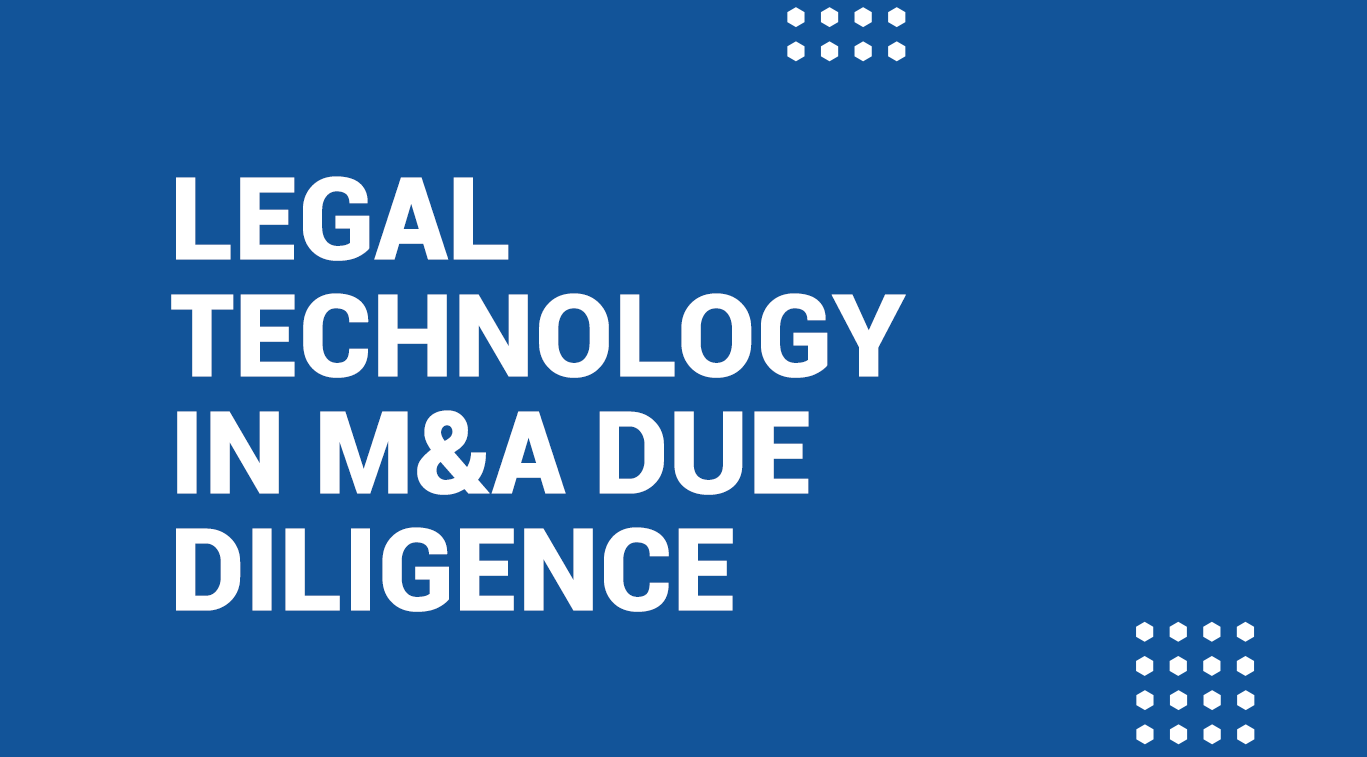Digital Due Diligence in M&A Activity

Written by Maryam Khan
Blogger

The legal due diligence process is the preliminary step taken by a client who wishes to enter into a transaction. The process involves assessing the potential risks of a transaction by investigating the obligations and liabilities of the target company. The due diligence process is extremely important and can sometimes be complex. Therefore, it must be carefully executed as it involves a review of countless transaction documents and contracts. The review process can be complicated as manually organising documents wastes a lawyers time and energy on administrative tasks that do not require their legal knowledge and experience.
While digital due diligence is not a new concept, its importance is increasing as the world becomes more interconnected, digitally advanced and dependent on technology. The growing demand and integration of legal technology into the operations of a law firm and the wider legal sector has significantly simplified the due diligence process by automating various tasks. Lawyers no longer have to spend their billable hours on menial administrative tasks as the responsibility for such work has been shifted to due diligence software, artificial intelligence and automated programming [1].
What is the Current State of M&A Due Diligence?
While the Covid-19 pandemic caused unprecedented economic disruption, global M&A activity increased to reach a new high at the beginning of 2021, with deal activity reaching $2.6 trillion [2]. Alongside the increase in deal activity, the challenges and risks associated with the management of the M&A process, particularly within due diligence, also increased since a successful M&A deal is heavily dependent on collaboration supported by the right tools and resources [3]. Therefore, law firms must invest in streamlining their processes to maximise compliance, increase communication and mitigate the risks associated with hybrid working models and the changing regulatory climate brought by the pandemic [4].
In addition to an escalating workload, law firms have to prioritise incorporating the right tools to ensure efficiency, effective communication and collaboration as legal teams are now more geographically dispersed than ever due to hybrid working models [5]. As a result, integrating legal technology to streamline due diligence processes has become a norm to improve process efficiencies and ensure that lawyers focus more on executing deals instead of getting caught up in endless streams of data [6].
What Type of Legal Technology is Involved?
The growing market pressure and increased data collection have made the due diligence process more sophisticated. Law firms that create a streamlined diligence process are developing a competitive edge and are standing out to potential clients. Therefore, integrating legal technology found within due diligence software such as virtual data rooms, artificial intelligence and machine learning can transform the way due diligence is carried out compared to the time-consuming, tedious and outdated traditional practices [7].
Virtual Data Rooms
The sheer volume of data assessed in a short period in M&A deals and transactions creates significant challenges within the due diligence process. However, virtual data rooms help improve efficiency by centralising documents, allowing for less email correspondence and encouraging multi-party collaboration on one platform [8]. A virtual data room, also known as a ‘deal room’, is a secure online repository for document storage and distribution typically used during the due diligence process of a pending merger or an acquisition to collate, review, share and disclose company documents [9]. Virtual data rooms allow lawyers to provide their clients with direct access to the information needed to determine whether the client should progress with the deal in question [10].
They are also equipped with advanced analytical capabilities, including features that make workflow more efficient and impact how smoothly an M&A deal is carried out. These features also include in-platform messaging to increase communication and advance access control to redact or blackline a document [11]. Virtual data rooms also enable involved parties to exchange confidential information in a structured and transparent way, improving operational flow. Additional features include two-factor authentication, which acts as a precautionary measure to minimise security breaches and maintain confidentiality.
Artificial Intelligence & Machine Learning
The process of verifying and reviewing documents relating to a transaction is usually the leading cause of delays when making a deal. However, in the case of a high-value deal, there is less time to complete the process due to pressure from other prospective buyers. Here is where artificial intelligence and machine learning within virtual data rooms speed up the process by automating repetitive tasks enabling lawyers to capitalise on opportunities despite their busy schedules. It has been predicted by 64% of EMEA dealmakers that the due diligence process, which takes one to three months today, will take less than one month by 2025 due to the integration of new technologies [12]. The integration of artificial intelligence and machine learning improves the accuracy of workflows through the use of multilingual search capabilities and automated document reviews to help solve organisational challenges that typically delay the due diligence process.
Project Management Software
Project management software is used for project planning, scheduling, resource allocation and change management. It aims to facilitate the workflow of a team collaborating on the same project or even a bigger project involving multiple different teams within a law firm. Using the software, lawyers are kept up to date through notifications regarding the progress and timeline of the project. Additionally, tasks can also be easily assigned, reassigned and tracked to ensure all deadlines are met [13]. These features are extremely beneficial for law firms when completing due diligence for an M&A transaction as using the software allows for effective, organised collaboration and a smooth workflow. This avoids any disorganised email chains to communicate and delegate work which also results in missing information or the task being emailed to the wrong person. Moreover, while project management software can be used to streamline any kind of project within any industry, there are specialised due diligence software development platforms made for legal teams which centralise communication, delegate workflow, track progress and provide clarity as well as accountability [14].
Why is This Important for Law Firms?
Increased Security
Integrating legal technology in the due diligence process should be a key priority for law firms, given the confidential nature of their business. Data breaches, cybersecurity and data privacy risks are extremely important issues that face due diligence and overall M&A transactions [15]. A data breach can significantly impact a deal or lower its value by millions, as seen in Verizon’s acquisition of Yahoo in 2018 where Yahoo took a $350 million hit in the deal following three data breaches [16]. Features like customisable file access privileges ensure that deals run smoothly by storing information in a highly secure environment and preventing such data breaches which significantly impact a deal from occurring in the first place.
Rigorous Document Review
Artificial intelligence-based technology used in due diligence allows lawyers to review all contracts and documents relevant to a deal, not simply those that are considered important by the client. For a successful risk assessment, all contracts and documents need to be reviewed, even those that are considered insignificant. However, it is quite difficult to carry this out manually, so using machine learning allows for more data to be reviewed to ensure all risks are highlighted which may have been difficult to find manually before technology was available. Artificial intelligence is also well-suited to review commoditised documents such as leases or supply agreements, as businesses usually have one standard form that is used multiple times with different clients. Here, AI is extremely beneficial as due diligence software can successfully identify variations within standard contracts at a much better rate than lawyers whose focus is targeted more towards analysing the wider consequences and implications of such variations for a particular deal [17].
Effective Background Checks
Law firms and their clients are now collecting and processing more data than ever which makes it crucial to have the right resources to successfully perform background checks when carrying out due diligence. Artificial intelligence and machine learning have the capacity to analyse thousands of data points in a matter of minutes compared to lawyers who will take more time and are more prone to making mistakes [18].
Reduced Risk
Using due diligence software compared to a manual process helps mitigate any risks that could occur during an M&A transaction. Due diligence being heavily based on organising supporting documents and contracts and other administrative tasks can create room for potential delays caused by human error such as misplacing a document, forgetting to include a document in an email or sending the information to the wrong person. Having a centralised platform for document storage and sharing reduces the risk of such errors occurring, which can be quite costly, inconvenient and time-consuming to correct. Additionally, such mistakes can prevent long-lasting client relationships from forming as clients are less likely to work with law firms that face delays resulting from basic mistakes that law firms can easily avoid by using the right tools and resources.
Final Words
Regardless of which side of the deal a law firm is on, conducting due diligence is a time-consuming and intensive process. Lawyers representing a client selling a company spend hours and resources compiling information, and if the client is acquiring a company, then lawyers have to rigorously analyse and assess the information and documents provided.
It is important to keep in mind that while using software or incorporating AI to complete tasks is reliable, it is not perfect. Therefore, legal teams are still required to review it themselves to take advantage of efficient data extraction. Law firms will never simply present the identified information directly to the client as it first needs to be analysed, reviewed and presented alongside the goals and priorities of the client.
The major advantage is that legal technology saves nearly 50% of the time taken for the initial review if done manually. Integrating legal technology within the due diligence process allows law firms to actualise their objectives and achieve their goals much more efficiently. The combination of artificial intelligence and machine learning ensure that law firms remain competitive in the future.
References
[1] Merlin Piscitelli, ‘How Can Technology Transform M&A Due Diligence’, Lawyer Monthly (2021) at https://www.lawyer-monthly.com/2021/10/how-can-technology-transform-ma-due-diligence/
[2] ‘Global M&A Hits Highest Value On Record As Post-Pandemic Market Starts To Take Shape’ EY Press Release (2021) at https://www.ey.com/en_gl/news/2021/07/global-m-a-hits-highest-value-on-record-as-post-pandemic-market-starts-to-take-shape
[3] Ibid (1)
[4] Ibid
[5] Katie May,‘The Power of Remote Working During The Pandemic’, Lawyer Monthly (2021) at https://www.lawyer-monthly.com/2020/04/the-power-of-remote-working-during-the-pandemic-crisis/
[6] Ibid
[7] Kishan Patel, ‘Data Due Diligence Technology Trends 2022’, DealRoom (2021) at https://dealroom.net/blog/the-increasing-significance-of-m-a-due-diligence
[8] Ibid
[9] Will Kenton, ‘Virtual Data Room (VDR)’, Investopedia (2021), at https://www.investopedia.com/terms/v/virtual-data-room-vdr.asp#:~:text=A%20virtual%20data%20room%20(VDR,share%2C%20and%20disclose%20company
%20documentation.
[10] Ibid (1)
[11] Ibid
[12] Ibid
[13] ‘What is Project Management’, Alpha Serve Blog at https://www.alphaservesp.com/blog/what-is-project-management-software/
[14] Ibid (7)
[15] Ibid
[16] Jeremy Kirk, ‘Yahoo Takes $350 Million Hit In Verizon Deal’, Bank Info Security (2017) at https://www.bankinfosecurity.com/yahoo-takes-350-million-hit-in-verizon-deal-a-9736
[17] Travers Smith, ‘How AI is Changing Legal Due Diligence’ (2020) at https://www.traverssmith.com/media/6382/how-ai-is-changing-legal-due-diligence.pdf
[18] ‘The Power of AI in business-Redefining Due Diligence’, Intelligo Insights Blog (2021) at https://www.intelligo.ai/blog/ai-in-business-redefining-due-diligence/a








